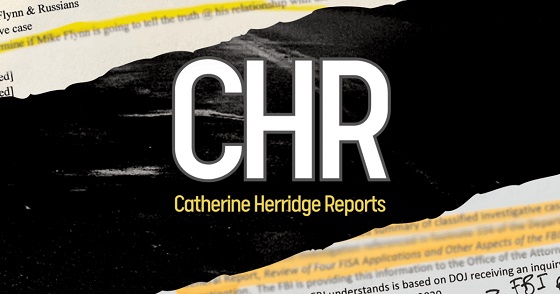Catherine Herridge
Whistleblowers: Best Way to Bury Government Misconduct Is To Call In The Inspector General

| TOP LINE | |||||
| I’ve heard complaints from many whistleblowers who allege the “best way to bury government misconduct is to call in the Inspector General.” | |||||
| This week’s report from the Justice Department’s internal watchdog delivers exhaustive detail, but it is light on accountability. | |||||
| The Justice Department misled federal courts with no significant consequences. | |||||
| DEEP DIVE | |||||
| The new Justice Department Inspector General report suggests the federal courts rubber stamped DOJ subpoenas for phone records of congressional investigators – with no significant consequences to date. | |||||
| In last week’s newsletter, I was among the first to predict the Justice Department IG would soon release its findings into government overreach, specifically the abuse of compulsory process (including subpoenas) to obtain phone and email records. | |||||
|
|||||
| This is NOT the first time that FBI and DOJ officials have misled the federal courts to obtain evidence for criminal investigations. The FBI and Justice Department improperly used unsubstantiated claims, and news reports, to secure surveillance warrants for Trump campaign aide Carter Page. | |||||
| A former FBI agent who has personally drafted FISA warrants told me he had never seen surveillance applications that cited news stories. | |||||
|
|||||
| I have reviewed the Inspector General’s report and singled out one of the most important findings on page 4. It found Justice Department officials obfuscated the true identity of their targets and the construct for their leak investigations which probed media outlets and congress. | |||||
| Most IG reports pass with limited media attention, but this one titled “A Review of the Department of Justice’s Issuance of Compulsory Process to Obtain Records of Members of Congress, Congressional Staffers, and Members of the News Media,” drew attention across the board. | |||||
| Two Factors: the report impacts reporter records, and it found that the FBI and DOJ collected phone records on then GOP-congressional staffer Kash Patel who is now nominated by President Trump to lead the FBI. | |||||
|
|||||
| What’s clear from the findings is that the Justice Department relied on “boilerplate” language in its Non-Disclosure Order applications to the court. NDOs can block reporters and congress, as the report notes, from “learning about the use of compulsory process” to seek their records. That delays, and in some cases prevents, the subjects from challenging the process in the federal judiciary. | |||||
| The courts did not have the full picture from the Justice Department, and the blame squarely falls on the DOJ. The DOJ was not transparent about its efforts to secure records from members of Congress and their investigators who were probing the origins of the FBI’s probe into alleged collusion between the Trump campaign and Russia. | |||||
| On its face, the DOJ’s withholding of information from the courts appears to be an act of commission. If the courts had known the FBI and DOJ were seeking records from congressional investigators, the federal judges might have pushed back requiring immediate notification to the parties. | |||||
| Patel seemed a prime target. Because of his extensive experience at the Justice Department, he understood and could expose defects in the surveillance (FISA) warrants for Trump campaign aide Carter Page, among other irregularities in the FBI/DOJ case. | |||||
| According to Kash Patel’s 2023 lawsuit against Justice Department officials and FBI Director Wray, he didn’t learn about the subpoena for his google records until several years after the fact. | |||||
| As I reported in last week’s newsletter, I faced severe push back, including the threat of attacks on my journalistic integrity from a justice department official when I reported allegations that in 2018 then Deputy Attorney Rosenstein threatened to subpoena Patel and others. | |||||
| While the FBI and DOJ officials disputed the characterization of the 2018 clash between these two branches of government, this week’s report confirms that Justice Department had already sought the records for Patel and others months earlier. | |||||
| Buried at the back of the report on page 81 are the top line recommendations. The first recommendation calls for the expansion of protections and internal review protocols for obtaining records from the news media. The second and third recommendations call for greater transparency when the DOJ investigates Congress which has oversight for the Justice Department. | |||||
|
|||||
| WHEN KASH PATEL GOT THE CBS NEWS TREATMENT | |||||
| Kash Patel has always been a political lightning rod. | |||||
| When I arrived at CBS News in November 2019, a senior executive told me that I brought a “fresh dimension” to the Network’s news gathering because I had deep contacts on both sides of the aisle. | |||||
| We interviewed Kash Patel for a story in December 2019. CBS News titled the report, “White House staffer Kash Patel denies he was back channel to Trump on Ukraine.” | |||||
| The interview was roundly rejected by the CBS broadcast shows. A senior producer on the CBS Evening News told me the interview wasn’t “newsy enough” to qualify for their broadcast. | |||||
| The story was eventually posted to the CBS News website. At the time, I was taken aback by what seemed internal resistance to presenting all points of view on the Impeachment story. | |||||
| At CBS News, I was surprised and disappointed to find a culture where many colleagues seemed content to confirm the reporting of other networks, rather than break news first. There were exceptions, but when it came to politics, I experienced a “follow the pack” mentality. | |||||
| I’ll have more to say about the blowback over the Kash Patel reporting. | |||||
| While this content is free, consider becoming a monthly subscriber to support our independent journalism and access future content. | |||||
| Thank you for the consideration and, most of all, for supporting our work! | |||||
| Best, Catherine | |||||
|
Catherine Herridge
FBI imposed Hunter Biden laptop ‘gag order’ after employee accidentally confirmed authenticity: report

From LifeSiteNews
Two independent journalists found that the FBI could have set the record straight by confirming the laptop was real and the subject of an ongoing criminal probe. Instead, FBI leadership allowed the false narrative about the laptop to gain momentum.
In a shocking report published on X, independent journalists Catherine Herridge and Michael Shellenberger revealed that an FBI agent accidentally confirmed to Twitter (now known as “X”) that the Hunter Biden laptop story was real less than three weeks before the 2020 election.
“For the first time, and with a change of administration, the FBI has now turned over to GOP House investigators the internal chat messages that show Bureau leadership actively silenced its employees,” Herridge and Shellenberger wrote on X.
“The FBI, which had a special task force to counter foreign election interference, could have set the record straight by confirming the laptop was real and the subject of an ongoing criminal probe,” the journalists explained. “Instead, FBI leadership allowed the false narrative about the laptop to gain momentum.”
“In 2024, an FBI official admitted to House investigators that an FBI employee had inadvertently confirmed the authenticity of Hunter Biden’s laptop to Twitter on a conference call the morning of October 14, 2020, the day the New York Post published a story about it,” Shellenberger wrote.
“I recall that when the question came up, an intelligence analyst assigned to the Criminal Investigative Division said something to the effect of, ‘Yes, the laptop is real,’” testified the then-Russia Unit Chief of the FBI’s Foreign Influence Task Force in a closed-door transcribed interview,” according to Herridge and Shellenberger. “I believe it was an (Office of General Counsel) attorney assigned to the (Foreign Influence Task Force) stepped in and said, ‘We will not comment further on this topic.’”
They recounted this exchange:
An individual whose name is blacked out, tells Elvis M. Chan, the San Francisco-based FBI special agent tasked with interacting with social media companies, there was a “gag order” on discussion of Hunter Biden’s laptop. In a separate exchange, Chan is told “official response no commen(t).”
In the chat, the FBI officials showed awareness that the laptop may have contained evidence of criminal activity.
Asked Chan, “actually what kind of case is the laptop thing? corruption? campaign financing?”
Another FBI employee responds, “CLOSE HOLD —” after which the response is redacted.
To which Chan responds, “oh crap,” appearing to underscore the serious nature of the probe, which included felony tax charges. Chan adds, “ok. It ends here.”
In the same conversation, Chan is asked if “anyone discussing that NYPost article on the Biden’s?” Chan responds, “yes we are. c d confirmed an active investigation. No further comment.” “C D” is likely shorthand for the FBI’s Criminal Division.
Said another FBI employee, whose name was redacted by the Bureau, “please do not discuss biden matter.”
It’s now common knowledge that national security agencies — including the FBI and CIA, Big Tech, and much of corporate media — colluded in suppressing truth and manufacturing lies in order to drag their preferred candidate, Joe Biden, across the finish line in the 2020 presidential election.
Incriminating evidence discovered on the laptop that Hunter Biden had long ago abandoned at a computer repair shop — reported on in two devastating pieces by the New York Post at the time — was ignored by mainstream media, fraudulently dismissed by former national intelligence officials, and essentially made inaccessible to the public by Big Tech social media sites Twitter and Facebook.
The computer contained emails showing that then-Vice President Biden had come under the influence of bad actors in Ukraine and Communist China and had used his powerful position in the Obama administration to pressure government Ukrainian officials into firing a prosecutor who was investigating the energy firm, Burisma, which was paying the younger Biden $50,000 per month to sit on its board of directors.
Catherine Herridge
How ‘Woke’ Broke The FBI

 Catherine Herridge
Catherine Herridge
We Obtain Internal FBI DEI Guide On Managing Unconscious Bias
| TOP LINE |
| An internal FBI inclusivity “Guide,” obtained by our investigative team, counseled agents on “Ways to Manage Your Unconscious Bias,” “Micro-Inequities” and “How to Improve Your Inclusive Intelligence.” |
| “The New IQ: Your Guide to Sustaining Inclusive Habits in the Workplace” was widely shared in mid-2020 and includes nine “tips” to counter unconscious bias. |
|
||||||||||||||||||||||||
|
-

 National2 days ago
National2 days agoMedia bound to pay the price for selling their freedom to (selectively) offend
-

 Business2 days ago
Business2 days agoIs there a cure for Alzheimer’s Disease?
-

 C2C Journal2 days ago
C2C Journal2 days agoLearning the Truth about “Children’s Graves” and Residential Schools is More Important than Ever
-

 Bruce Dowbiggin2 days ago
Bruce Dowbiggin2 days agoSometimes An Ingrate Nation Pt. 2: The Great One Makes His Choice
-

 Alberta2 days ago
Alberta2 days agoNew era of police accountability
-

 Brownstone Institute2 days ago
Brownstone Institute2 days agoThe Unmasking of Vaccine Science
-

 Alberta2 days ago
Alberta2 days agoEmissions Reduction Alberta offering financial boost for the next transformative drilling idea
-

 Business20 hours ago
Business20 hours agoRecent price declines don’t solve Toronto’s housing affordability crisis












